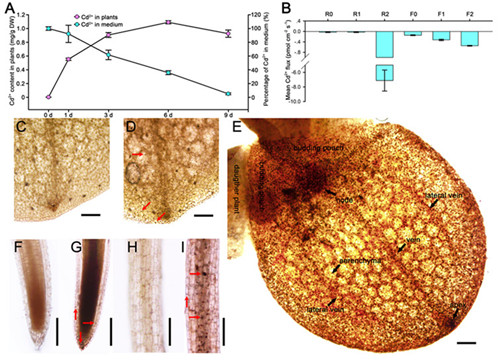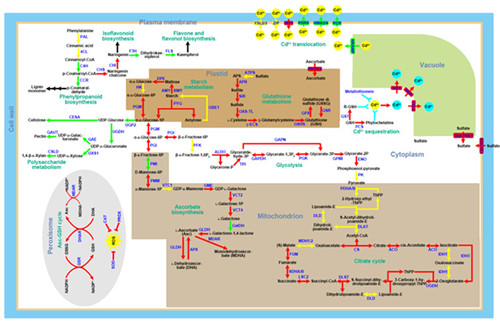Cadmium (Cd) is a heavy metal contaminant that is extensively distributed in the environment, especially in water and soil. Water is a major medium of Cd diffusion in nature, and Cd is generally translocated into soil through irrigation. Thus, much attention has recently been paid to water pollution control and Cd contamination.
Recently, clone 6001 of Landoltia punctata, which showed high Cd tolerance, was obtained by large-scale screening of over 200 duckweed clones by a research team from Qingdao Institute of Bioenergy and Bioprocess Technology (QIBEBT), Chinese Academy of Sciences (CAS). L. punctata 6001 was also verified as a promising candidate for Cd phytoremediation based on several specific characteristics, such as higher biomass increase, adequate Cd2+ influx, and hyperaccumulation of Cd (Figure 1).
Next-generation-sequencing (NGS) was employed to provide transcriptomics data and helped to investigate genome-wide regulation in response to Cd2+ stress (Figure 2). Genes involved in basal biological processes from DNA to protein metabolism responded to Cd stress. The carbohydrate metabolic flux tended to be modulated to cope with Cd cytotoxicity as well. The expression of some transcripts encoding enzymes involved in cell wall biosynthesis were downregulated, while the transcription levels of genes involved in glycolysis and tricarboxylic acid cycle were up-regulated. Some upregulated transcripts encoded the enzymes involved in antioxidation and sulfur assimilation, which suggests that sulfur and ROS metabolism were likely to be enhanced under Cd stress. Finally, enhanced expression of tonoplast-localized transporters including MTP, MRP, and YSL may be conducive to vacuolar accumulation of Cd in L. punctata 6001.
The related work was published in Journal of Chemosphere.

Figure 1. Cd flux, accumulation, and distribution in L. punctata 6001. (Image by XU Hua)

Figure 2. Mechanism of cadmium detoxification in L. punctata 6001. (Image by XU Hua)
(Text by XU Hua)
Contact:
Prof. Zhou Gongke, Ph.D,
Qingdao Institute of BioEnergy and Bioprocess Technology, Chinese Academy of Sciences
Tel: 86-532-80662731
E-mail: zhougk@qibebt.ac.cn